Sohrab Merwanji Modi is a Actor, Director and Producer Indian born on 2 november 1897 at Mumbai (Inde)

Sohrab Modi (1897–1984) was an Indian Parsi stage and film actor, director and producer. His films include Khoon Ka Khoon (1935), a version of Shakespeare's Hamlet, Sikandar, Pukar, Prithvi Vallabh, Jhansi ki Rani, Mirza Ghalib, Jailor and Nausherwan-E-Adil (1957). His films always carried a message of strong commitment to social and national issues.
Pukar was set in the court of the Mughal Emperor Jehangir and is based on an incident, perhaps fictional, that highlights Jehangir's fair sense of justice. Many of the key scenes were staged in the magnificent courts and palaces of the Mughals, which gave the film an authenticity that studio built sets could never achieve. The charisma of its stars, Chandra Mohan and Naseem Bano, and Kamaal Amrohi's oration, with its literary flourish and innate grace, ensured the film's popularity.
Perhaps Modi's greatest film was Sikander, which immortalized Prithviraj Kapoor playing the title role. This epic film was set in 326 BC when Alexander the Great, having conquered Persia and the Kabul Valley, descends on the Indian border at Jhelum and encounters Porus (Modi), who stops the advance with his troops. Sikander's lavish mounting, huge sets, and production values equalled Hollywood's best, particularly in its rousing and spectacular battle scenes. The movie was rated by a British writer as "well up to the standard of that old masterpiece The Birth of a Nation." Its dramatic, declamatory dialogue gave both Prithviraj Kapoor and Sohrab Modi free rein to their histrionic proclivities.
The release of the film coincided with World War II at its peak and in India the political atmosphere was tense following Gandhiji's call to Civil Disobedience. Sikander further aroused patriotic feelings and national sentiment. Thus, though Sikander was approved by the Bombay censor board, it was later banned from some of the theatres serving army cantonments. However, its appeal to nationalism was so great and direct, it remained popular for years. It was revived in Delhi in 1961 during the Indian March into Goa.
Prithvi Vallabh was based on K.M. Munshi's novel of the same name. The film's major highlights were the confrontations between Modi and Durga Khote, the haughty queen Mrinalvati, who tries to humiliate him publicly but then falls in love with him.
Although Modi went beyond Parsee theatre with such themes as illicit passion (Jailor (1938), remade in 1958) and incest (Bharosa (1940)), his formal approach still remained tied to the theatre. He re-created the look and sound of Parsee theatre by using frontal compositions and staging the narrative in spatial layers with copious use of Urdu dialogue.
In 1946 after his relationship with Naseem had run its course (though she continued to work with him in Sheesh Mahal (1950) and Nausherwan-e-Adil (1957)), he married Mehtab, an actress 20 years his junior whom he had directed in Parakh (1944).
In 1950, when Sohrab Modi's Sheesh Mahal was being screened at Minerva Theatre in Bombay, the actor was present at the hall. Mr. Modi noticed a man sitting in the front row with closed eyes. Upset with such a reaction, he asked an attendant to let the viewer out and to return his money. The employee came back to say that the person was blind but had come just to hear Sohrab Modi's lines.
For Jhansi ki Rani (1953), India's first technicolour film, Modi had technicians flown in from Hollywood. Mehtab starred as the young queen of Jhansi who took up arms against the British during the Mutiny of 1857 with Modi playing the role of the Rajguru, her chief advisor. The film was notable for its authenticity in creating the right period and delineating historical events, its spectacular battle scenes and Mehtab's stirring performance though she was far too old for the role. She achieves stirring dignity in the role as she vows to protect Jhansi from all enemies both within and outside. The ball sequence in Jhansi's palace was superbly shot and Modi's characters held great emotional appeal. The film failed to connect with the audience and was a costly misfire for Modi as a box office crash.
Modi however bounced back with Mirza Ghalib (1954). The film, based on the life of the great Indian poet who lived during the reign of Bahadur Shah Zafar, the last of the Mughal Emperors, won the President's Gold Medal for Best Feature Film of 1954. The film beautifully captured the mood of the period, its hedonistic pursuits and the fading magnificence of the court of the last Mughal, where poets like Zauq, Momin, Tishna, Shefta and Ghalib assembled to recite their verse. Mirza Ghalib also saw Suraiya's finest dramatic performance as she embodied the role of the married Ghalib's lover, a courtesan. Ghalib also saw some of her finest singing - "Aah ko Chaihiye Ek Umar," "Nuktacheen Hai Gham-e-Dil," "Dil-e-Nadaan Tujhe Hua Kya Hai," "Yeh Na Thi Humari Kismet,". Her singing is to date regarded as the definitive portrayal of Ghalib. In fact India's then Prime Minister Jawaharlal Nehru paid her the ultimate compliment by telling her she had brought Mirza Ghalib to life. ("Tumne Mirza Ghalib ki Rooh ko Zinda Kar Diya").
Though Kundan (1955), Nausherwan-e-Adil and Jailor (1958) had their moments, particularly the latter in which Modi gave a chilling portrayal of a rational man turned into a tyrant, Modi's later films did not reach the heights of his earlier work.
Source : Wikidata
Sohrab Merwanji Modi

Nationality Inde
Birth 2 november 1897 at Mumbai (Inde)
Death 28 january 1984 (at 86 years) at Mumbai (Inde)
Awards Dadasaheb Phalke Award
Birth 2 november 1897 at Mumbai (Inde)
Death 28 january 1984 (at 86 years) at Mumbai (Inde)
Awards Dadasaheb Phalke Award
Biography
He launched Minerva Movietone in 1936. His early films at Minerva dealt with contemporary social issues such as alcoholism in Meetha Zaher (1938) and the right of Hindu women to divorce in Talaq (1938). Though the films did well, what attracted Modi was the historic genre. Minerva Movietone became famous for its trilogy of historical spectaculars that were to follow - Pukar (1939), Sikander (1941) and Prithvi Vallabh (1943), wherein Modi made the most of his gift for grandiloquence to evoke historical grandeur.Pukar was set in the court of the Mughal Emperor Jehangir and is based on an incident, perhaps fictional, that highlights Jehangir's fair sense of justice. Many of the key scenes were staged in the magnificent courts and palaces of the Mughals, which gave the film an authenticity that studio built sets could never achieve. The charisma of its stars, Chandra Mohan and Naseem Bano, and Kamaal Amrohi's oration, with its literary flourish and innate grace, ensured the film's popularity.
Perhaps Modi's greatest film was Sikander, which immortalized Prithviraj Kapoor playing the title role. This epic film was set in 326 BC when Alexander the Great, having conquered Persia and the Kabul Valley, descends on the Indian border at Jhelum and encounters Porus (Modi), who stops the advance with his troops. Sikander's lavish mounting, huge sets, and production values equalled Hollywood's best, particularly in its rousing and spectacular battle scenes. The movie was rated by a British writer as "well up to the standard of that old masterpiece The Birth of a Nation." Its dramatic, declamatory dialogue gave both Prithviraj Kapoor and Sohrab Modi free rein to their histrionic proclivities.
The release of the film coincided with World War II at its peak and in India the political atmosphere was tense following Gandhiji's call to Civil Disobedience. Sikander further aroused patriotic feelings and national sentiment. Thus, though Sikander was approved by the Bombay censor board, it was later banned from some of the theatres serving army cantonments. However, its appeal to nationalism was so great and direct, it remained popular for years. It was revived in Delhi in 1961 during the Indian March into Goa.
Prithvi Vallabh was based on K.M. Munshi's novel of the same name. The film's major highlights were the confrontations between Modi and Durga Khote, the haughty queen Mrinalvati, who tries to humiliate him publicly but then falls in love with him.
Although Modi went beyond Parsee theatre with such themes as illicit passion (Jailor (1938), remade in 1958) and incest (Bharosa (1940)), his formal approach still remained tied to the theatre. He re-created the look and sound of Parsee theatre by using frontal compositions and staging the narrative in spatial layers with copious use of Urdu dialogue.
In 1946 after his relationship with Naseem had run its course (though she continued to work with him in Sheesh Mahal (1950) and Nausherwan-e-Adil (1957)), he married Mehtab, an actress 20 years his junior whom he had directed in Parakh (1944).
In 1950, when Sohrab Modi's Sheesh Mahal was being screened at Minerva Theatre in Bombay, the actor was present at the hall. Mr. Modi noticed a man sitting in the front row with closed eyes. Upset with such a reaction, he asked an attendant to let the viewer out and to return his money. The employee came back to say that the person was blind but had come just to hear Sohrab Modi's lines.
For Jhansi ki Rani (1953), India's first technicolour film, Modi had technicians flown in from Hollywood. Mehtab starred as the young queen of Jhansi who took up arms against the British during the Mutiny of 1857 with Modi playing the role of the Rajguru, her chief advisor. The film was notable for its authenticity in creating the right period and delineating historical events, its spectacular battle scenes and Mehtab's stirring performance though she was far too old for the role. She achieves stirring dignity in the role as she vows to protect Jhansi from all enemies both within and outside. The ball sequence in Jhansi's palace was superbly shot and Modi's characters held great emotional appeal. The film failed to connect with the audience and was a costly misfire for Modi as a box office crash.
Modi however bounced back with Mirza Ghalib (1954). The film, based on the life of the great Indian poet who lived during the reign of Bahadur Shah Zafar, the last of the Mughal Emperors, won the President's Gold Medal for Best Feature Film of 1954. The film beautifully captured the mood of the period, its hedonistic pursuits and the fading magnificence of the court of the last Mughal, where poets like Zauq, Momin, Tishna, Shefta and Ghalib assembled to recite their verse. Mirza Ghalib also saw Suraiya's finest dramatic performance as she embodied the role of the married Ghalib's lover, a courtesan. Ghalib also saw some of her finest singing - "Aah ko Chaihiye Ek Umar," "Nuktacheen Hai Gham-e-Dil," "Dil-e-Nadaan Tujhe Hua Kya Hai," "Yeh Na Thi Humari Kismet,". Her singing is to date regarded as the definitive portrayal of Ghalib. In fact India's then Prime Minister Jawaharlal Nehru paid her the ultimate compliment by telling her she had brought Mirza Ghalib to life. ("Tumne Mirza Ghalib ki Rooh ko Zinda Kar Diya").
Though Kundan (1955), Nausherwan-e-Adil and Jailor (1958) had their moments, particularly the latter in which Modi gave a chilling portrayal of a rational man turned into a tyrant, Modi's later films did not reach the heights of his earlier work.
Usually with
Filmography of Sohrab Merwanji Modi (30 films)
Actor

Razia Sultan (1983)
Directed by Kamal Amrohi (Amrohvi)
Genres Drama, Biography, Historical
Actors Hema Malini, Dharmendra, Parveen Babi, Sarika, Vijayendra Ghatge, Radha Saluja
Rating61%





The film is based on the life of Razia Sultan (1205–1240), the only female Sultan of Delhi (1236–1240) and her speculated love affair with the Abyssinian slave, Jamal-ud-Din Yakut.
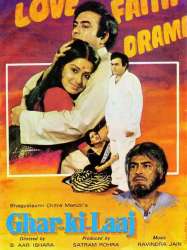
Ghar Ki Laaj (1979)
Directed by B. R. Ishara
Actors Moushumi Chatterjee, Krishna Chandra Dey, Aruna Irani, Sanjeev Kumar, Sohrab Merwanji Modi, Deven Varma
Rating28%





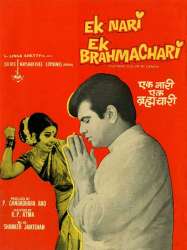
Ek Nari Ek Brahmachari (1971)
Directed by K. Pratyagatma
Genres Drama, Comedy
Actors Jeetendra, Mumtaz, Aruna Irani, Syed Ishtiaq Ahmed Jaffery, Durga Khote, Sohrab Merwanji Modi
Rating61%





Raisaheb Surajbhan Chaudhary lives a wealthy lifestyle in a palatial mansion with his wife of 30 years, Rajlaxmi, and two sons, Rajkumar, who has been married to Shyama for several years; and Mohankumar who is studying in an out f town college. Surajbhan is disappointed with Rajkumar as he has as yet not produced an heir to his family. To make matters worse Mohan, a devout worshiper of Lord Bajrangbali, has taken a vow of celibacy and refuses to get married. Things change dramatically when a young woman named Neena, along with her son, enters the Chaudhary household claiming that Mohan had married and abandoned her. She goes through a number of medical tests which determine that the child is actually an heir of the Chaudhary family. Now Surajbhan and Rajlaxmi want Mohan and Neena to get officially married, much to Mohan's chagrin. Things get complicated when Surajbhan finds out that the child is actually Rajkumar's, and that Neena may have been pulling wool over all their eyes.

Jwala (1971)
Genres Action
Actors Sunil Dutt, Madhubala, Sohrab Merwanji Modi, Pran Krishan Sikand, Goga Kapoor, David Abraham
Rating45%






Yahudi (1958)
, 2h50Directed by Bimal Roy
Origin Inde
Genres Drama, Action, Peplum, Romance
Themes Films set in Africa, Films about religion, Political films, Films about Jews and Judaism, Films based on plays, Films about royalty
Actors Dilip Kumar, Meena Kumari, Sohrab Merwanji Modi, Nazir Hussain, Nigar Sultana, Helen Khan
Roles Ezra
Rating70%





Ezra (Sohrab Modi) is a jeweller who has a son called Elijah. He also has a friendly butler/child minder called Emmanuel. In the beginning, Ezra is due to leave. As he does, Elijah becomes upset and stands at the balcony. In the roads of the Jewish area, Brutus (Nazir Hussain), Governor of Rome, is passing, making an announcement. Watching over the balcony, is Elijah. A stone slips from his hand and hits Brutus on the head. Brutus immediately gets Elijah arrested, and as Elijah is a Jew, sentences him to death. Hearing this, Ezra rapidly returns from his trip and arrives at the doorstep of Brutus. He begs Brutus to free Elijah but Brutus feeds Elijah to hungry lions. Ezra sadly returns to his house. In revenge, Emmanuel kidnaps Lydia, motherless daughter of Brutus, and takes her to Ezra. Ezra declines to kill Lydia and adopts the child.

Jailor (1958)
, 1h50Directed by Sohrab Merwanji Modi
Actors Sohrab Merwanji Modi, Kamini Kaushal, Geeta Bali, Abhi Bhattacharya, Nana Palsikar, Daisy Irani
Roles Dilip, the jailor
Rating61%





Dilip (Sohrab Modi is a kind-hearted prison warden (Jailor), who lives with his wife Kanwal (Kamini Kaushal) and little daughter Bali (Daisy Irani). Kanwal enjoys herself by staying out late at parties and meeting people. She equates her life in the house as a jail. Dilip tells her that her life is within the four walls of the house, and orders her not to go out without his permission. Kanwal hates the scar on her husband’s face and taunts Dilip about his ugly looks. Kanwal finally elopes with Dr Ramesh leaving her daughter behind. This turns Dilip into a hard cruel man who becomes oppressive. Kanwal and Dr. Ramesh go through hardships with Ramesh turning blind and Kanwal becoming disfigured following an accident. Dilip goes to the hospital and brings Kanwal back home. He has her locked up in her room forbidding her to meet her daughter. His constant taunts and berating compel Kanwal to commit suicide. Bali falls sick and dies.

Nausherwan-E-Adil (1957)
, 2h17Directed by Sohrab Merwanji Modi
Actors Sohrab Merwanji Modi, Naseem Banu, Mala Sinha, Raaj Kumar, Bipin Gupta, Agha
Roles Sultan-e-Iran Nausherwan-e-Adil
Sultan-e-Iran (Emperor of Iran) is a Just ruler and known as such, Nausherwane-e-Adil (Nausherwan The Just) (Sohrab Modi). His laws are equal for everyone and follows them in his dispensation of Justice. However when questioned about a certain ruling by a Christian priest David (Bipin Gupta), he realises that the laws he is following have come down through ages without being written down. He decides to rectify this and gets his Wazir (Niranjan Sharma) to start work on it. Nausherwan now decides to go incognito into his country to see for himself if his people are contented and happy. When he returns he sets about bringing reformation in the laws with the help of his judiciary. He puts forth two laws; anyone deceiving a girl will be walled up, and anyone betraying the state will be put to death.

Raj Hath (1956)
, 2h30Directed by Sohrab Merwanji Modi
Actors Madhubala, Pradeep Kumar, Tun tun (Uma Devi Khatri), Sohrab Merwanji Modi
Rating62%





The king of Jagmer, Maharaja Daljeet (Sohrab Modi), sends a marriage proposal to the king of a neighboring city, Sultanpur. In the proposal Maharaja Daljeet asks to marry his daughter, Raja Beti (Madhubala), to Kumar (Pradeep Kumar), the son of the king of Sultanpur (Ulhas). The king of Sultanpur strongly rejects the proposal and states that the long term rivalry between the two empire is the reason for his refusal; he is injuriously disrespected by the messenger, Sabgram Singh (Murad). Later, the king of Sultanpur also says that Daljeet has conspired against his empire and by proposing the marriage he wants to take revenge. The disrespectful behavior of the king of Sultanpur makes Daljeet angry, and he orders preparations for a war against Sultanpur. Daljeet also provokes his daughter to take vengeance against the king of Sultanpur for the insult. The fortress of the king of Sultanpur is well known for a trap in which troops flounder. Daljeet learns of a map of the fortress, which will help troops navigate across the trap. While retrieving the map from the enemy camp, one of the Daljeet's important soldiers is caught and killed. Daljeet realizes the task is full of risk so he invites the bravest soldiers in the kingdom to try, but they all refuse. After the denial of the brave soldiers, Juhi (Kammo) and Raja Beti accept the task and dress up as men to infiltrate the enemy camp. After much hardship they at last get the map. While returning in disguise as a shepherdess, Raja Beti meets Kumar. Kumar on his first meeting begins to fall in love with her, but he is unaware that the shepherdess is actually the princess of Jagmer.
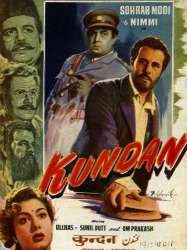
Kundan (1955)
, 2h1Directed by Sohrab Merwanji Modi
Genres Drama
Actors Sohrab Merwanji Modi, Nimmi, Sunil Dutt, Pran Krishan Sikand, Manorama, Kumkum
Roles Kundan
Rating66%





The film starts with Kundan (Sohrab Modi) stealing a loaf of bread from a kitchen and running home with it to feed his young niece Radha, and ailing mother. He is arrested and in court he says he had tried to find work, begged, and in the end was forced to steal. The judge sentences him to two years in prison. His niece visits him in jail telling him of his mother’s death. Kundan bends the iron rods and escapes but is caught. He is imprisoned for a further five years for trying to escape. The second time he tries to do so he gets an additional seven years. Kundan spends a total of fourteen years in prison doing hard labour. Radha (Nimmi) is married to Gopal (Pran) and they have a baby girl Uma. Gopal, who is in bad company and a crook gets her to part with all her jewellery and disappears with it. Radha and her baby find refuge with a tea-stall owner (Om Prakash) and his wife (Manorama)) who employ her to work for them for minimal wages. Kundan on release from jail sets out to find Radha. He has been told by the jail authorities including Inspector Sher Singh (Ulhas), a devout policeman, to keep them informed about his whereabouts and to present himself regularly at the police station. When he returns to his locality he is unable to find Radha and the neighbours drive him away, calling him a dacoit.

Jhansi Ki Rani (1953)
, 2h28Directed by Sohrab Merwanji Modi
Genres Drama, Historical
Actors Sohrab Merwanji Modi, Mehtab, Sapru, Srinath
Roles Rajguru
Rating68%





Rajguru (Sohrab Modi) decides that Jhansi should get its proper recognition in history. He comes across a young girl Manu (the young Rani Lakshmibai) played by Baby Shikha. Her father has been hit by a carriage driven by an English driver. She gathers a few children to confront the driver. This and her confrontation with an elephant impresses the Rajguru who takes her in hand, shaping her into becoming a determined leader. He arranges for her, at the age of nine, to marry the much-older ruler of Jhansi, Gangadhar Rao (Mubarak), who is about fifty years, and become Queen.
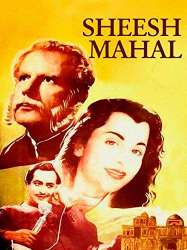
Sheesh Mahal (1950)
, 2h24Directed by Sohrab Merwanji Modi
Genres Drama
Actors Naseem Banu, Sohrab Merwanji Modi, Gajanan Jagirdar, Nigar Sultana, Pran Krishan Sikand, Leela Mishra
Roles Thakur Jaspal Singh
Rating18%





An old feudal aristrocrat, Thakur Jaspal Singh (Sohrab Modi) lives with his two daughters, Ranja (Naseem Banu) and Nalini (Pushpa Hans), and son Balram in a grand mansion called Sheesh Mahal. He maintains his long family ancestry and honour, citing the valour of olden days. His way of life far exceeds the money he has. His children try to warn him regarding his excessive spending but his feudal mind-set refuses to let others see that they are in dire straits. They finally have to sell their mansion to a former worker, Durgaprasad (Mubarak), who is now rich. They settle in a small hovel-like place. The brother finds work in the factory but meets with an accident where his leg is amputated. Desperate Ranjana finds work as a maid to Roopa (Nigar Sultana) Durgaprasad’s daughter. Jaspal Singh refuses Durgadas when he comes to ask for his daughter's hand in marriage to his son Vikram (Jawahar Kaul) claiming that Durgadas may have bought the Sheesh Mahal but he's still a labourer compared to the aristocratic family. Balram argues with his father about keeping up false pretences. Sundarmukh (Pran) who was to marry Ranjana but has broken the engagement because they are poor, comes and tells Jaspal that his daughter, in the guise of working at Durgadas' house is having an affair with his son. Jaspal is furious and rushes to kill Ranjana to avenge the Rajput honour. At the Sheesh Mahal, Durgadas stops him with a lecture on different warriors and honour. Jaspal falters and falls down the steps. Before he dies he blesses the union between Ranjana and Vikram.

Ek Din Ka Sultan (1945)
, 2h27Directed by Sohrab Merwanji Modi
Genres Drama, Historical
Themes Political films, Films about royalty
Actors Mehtab, Sohrab Merwanji Modi, Ghulam Mohammed
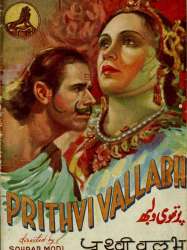
Prithvi Vallabh (1943)
Directed by Sohrab Merwanji Modi
Genres Drama
Actors Durga Khote, Sohrab Merwanji Modi, K. N. Singh (Krishan Niranjan Singh), P. Santha Kumari, Amirbai Karnataki
Rating73%






Sikandar (1941)
, 2h26Directed by Sohrab Merwanji Modi
Genres Drama, War, Historical, Peplum
Themes Politique, Political films, Films about royalty
Actors Prithviraj Kapoor, Sohrab Merwanji Modi, Meena Shorey, K. N. Singh (Krishan Niranjan Singh), Noor Jehan
Roles le roi Pûru
Rating70%





The film begins after Alexander the Great (Sikander in Hindi/Urdu) conquers Persia and the Kabul valley and approaches the Indian border at Jhelum. Sohrab Modi plays the Indian king Puru (Porus to the Greeks).
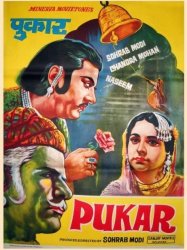
Pukar (1939)
, 2h45Directed by Sohrab Merwanji Modi
Genres Historical
Themes Political films, Films about royalty
Actors Chandra Mohan, Sohrab Merwanji Modi, Chandra Mohan, Naseem Banu, Sardar Akhtar
Rating70%





Set at the court of the harsh Mughhal Emperor Jehangir (Chandra Mohan), the film tells two separate love stories: the first of Mangal Singh (Ali) and Kanwar (Sheela) amid the violent feud raging between their families, and the second, the famous one of Jehangir and Nurjehan (Banu). Mangal kills the brother and father of his lover. His father, the loyal Rajput chieftain Sangram Singh (Modi), captures his son and Jehangir passes the death sentence. Jehangir's claim that the law knows no class distinction is put on the test when a washerwoman (Akhtar) accuses Queen Nurjehan of having inadvertently killed her husband during a hunt. Jehangir offers his own life but the washerwoman magnanimously forgives him.
 Connection
Connection


